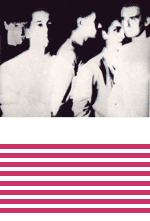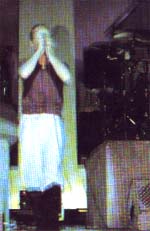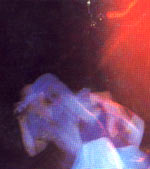Wonderful In Young Life | |

| How many records have you cut from your collection over the years? How many of those records did you cut from your life because really you were cutting memories and connections to times you would much rather leave behind? How many of those records do you eventually start to wish you still had? How many of those records have you since picked up on CD reissue? How many of those records remain lost forever? And how many of those memories remain locked and hidden away? There was a time that my collection held a great deal of Simple Minds records. This would be the early '80s we're talking about here, and although I'm not ashamed to say that Simple Minds meant a great deal to me in those times, I should also point out quite vociferously that I did not buy a Simple Minds record after the dreadful Sparkle In The Rain travesty, and must add indeed that said record was the first Simple Minds record to be axed from the pile. To be honest, once the pile started to diminish, it simply evaporated, and I had no regrets at the time at all. I suppose in many respects I still don't. Simple Minds were one of the THE very best reasons for despising Rock music in the mid-late '80s; one of the THE nastiest icons of a 'casual' culture that, certainly in the satellite towns of Glasgow, went hand in hand with violence and hatred. Their bombastic Heavy Metal somehow seemed a perfect reflection of the lack of imagination and intelligence of the nasty little neds, the moronic Pringle sweatered sheep with their Rangers scarves who would slice you with a Stanley knife just for fun. Somehow, the pomp and arrogance of Simple Minds seemed to fit it all so well, with the self-aggrandising bellow of Jim Kerr simply being the most obvious and most easily hated element. That it wasn't always thus almost seems like an irrelevance to be honest, although simply in terms of being able to listen to records as musical moments and as signifiers and reflectors of a culture that may or may not point to a future of horrors, it's probably useful to say it. Because just as there are Simple Minds records that you would be wise to catalogue as crimes against Pop of the very worst kind, there are also Simple Minds records that make a delightful dark noise, which make connections more to the drones and motorik rhythms of Krautrock and the decadent demented glamour of Roxy Music than to the bellow and empty pyrotechnics of the worst Stadium Rockers. There are Simple Minds records that you can read as making the same sorts of connections that other groups of the same era were making, and whose records have slipped into the realms of 'classics'. Had Simple Minds broke up in 1982, had they suffered some tragic suicide or death, we would not only have been spared some of the most hideous moments in music, but I bet we'd also be seeing lengthy magazine articles telling us all how influential and important they were. Which is more a reflection on the media than anything else, of course, but that's life. Simple Minds made some very influential and important records. I can say this with impunity because they influenced me, and were the soundtracks to some very important moments. Moments that I've kept locked away for a very long time, and moments indeed that will not creep far into the light for fear of collapse, but moments nonetheless that can begin to glance at the world of now and begin to ask questions. Questions like; 'why not?' and 'who was?' and 'was the sky really bluer in the summers of your youth?' The answers aren't important, but one might be 'of course they weren't, they just SEEMED bluer, higher, wider.' Simple Minds seemed bluer, higher, wider too. |

| I don't remember the first Simple Minds record I ever heard but it might have been something as late as 'I Travel'. 'I Travel' was a great Electro Disco tune lost behind what we used to call the Iron Curtain: Donna Summer if she'd lived in Belgrade. I had a 12" version and I played it a great deal. From there I went backwards and forwards, or it might have been forwards and backwards, I cant really say because the memories, as I said, are not really ready to come out into the light. There were records easily available and there were records not so easily available. I do recall having to order the 'Sweat In Bullet' and 'Love Song' singles from a strange record store in Ayr called 2001 and I recall travelling into Ayr every Saturday morning with my friend Scott, popping into a sewing supplies store to see a girl called (today I think it was) Claire, although it could easily have been Susan. Susan lived in Prestwick which is like saying she lived nowhere at all, and Claire was one of a group of girls Scott and I met one day when cycling the coast road back from Girvan. The sun was out, the sky was bluer and higher and wider than it had the right to be. We met them again in Fullarton Woods, and then again in Prestwick in a park where we were chased by 'punks' with knives. There was another friend called Gavin who lived in Prestwick and who it feels now hated me all along. I haven't seen him since he tried to fight me in the Peak District two years ago (or is it three?) and since he did fight another of my friends, in whose house we used to play Simple Minds records a great deal when we were younger and when the skies seemed bluer and higher and wider and if I can come close to tears (so the screen goes blurry) writing this you might realise why this is hard to remember and why I got rid of all those records and why suddenly it feels a bit like you've noticed that the arm you cut off ten years ago has grown back and it's grown back with it's fingers in your eyes. Simple Minds are all of these things. The first Simple Minds album Life In A Day was pretty poor, being the sound of a bunch of Glasgow (post) punks making their first scratches at getting sense from the noises in their heads. Before they were Simple Minds they were called Johnny and the Self Abusers, and that's quite an apposite name. |

| The second Simple Minds album was called Real To Real and it was startling. I first head it sitting in the bedroom of someone I wouldn't even vaguely call a friend, more one of those satellite acquaintances you have when you are fifteen. His older brother had more Simple Minds records than I could imagine at that time and we put on Real To Real and I was astounded. I hadn't heard music this strange, this difficult ever before. It sounded great. The satellite acquaintance hated it and that was just fine. We were both in love with the same person (for a month) and as I recall she hated Real To Real too, which was less than fine. I don't remember if I tried to argue the point. I probably did and that was probably the reason she never spoke to me again. Real To Real means these things now as much as the fact that it was, and remains the beginnings of the real interest in Simple Minds, being the point where their adventures with sonic textures really began to take shape; a point at which there were suggestions of dark, deep stirrings; a point where the monolith realities of Glasgow and the escapist mythology of European oddity began to merge. Perhaps even stranger now it also reminds me of the amorphous shape of an eight year old girl in the shadows, the sister of the satellite acquaintance, a shape that dies in a plane crash in Glasgow nineteen years later. Empires And Dance took the European dreaming further and created a soundtrack to inward journeys through smoky Budapest railway station cafes and booking halls. It was a record of travel that fittingly began with the intense adventurous intent of 'I Travel' and which ended with the duality of 'Kant-Kino' and 'Room' being a return or a retreat to a desolate starting point with the heavy knowledge that nothing has actually changed, that the only thing altered is a perception of the moment. The journeys have made no difference. It's a melancholic record that reminds me only of evenings spent in headphones looking out on grey streets, and on the back sleeve the band look like Kraftwerk dummies. I used to look at the picture and imagine Magazine singing 'I Love You (You Dummy)' to this picture, and to me, although that could be a lie. The Magazine connection is one to take note of because not only did the two bands share the same bill on several occasions, they also shared a sensibility of being somewhat awkward, obtuse, making marriages between edginess and lithe, supple rhythm. Magazine at their finest had John McGeoch making crescendos of sparklers fly from the guitar, Barry Adamson laying bass foundations that put strange angles on punk and funk and Devoto making great theatrical performances atop it all. Simple Minds had Charlie Burchill, Michael MacNeil and Derek Forbes. Simple Minds also had Brian McGee as their metronomic drummer, and it was over Forbes and McGee's foundations that Burchill would puncture the rhythm with guitar shards, MacNeil adding restrained swathes of keyboard and atop it all Jim Kerr with his great theatrical vocal performances. Nowhere was the importance of the balance of the band better illustrated than on the Sons and Fascination album. |

| With Sons and Fascination and it's accompanying limited edition mini-LP Sister Feelings Call Simple Minds made what were to be their finest recordings. It was with these songs that Simple Minds managed to create a sound that was both making reference and connection with the past, and making bold statements about what the future might hold. That of course the future was full of mistaken identities and the wrong roads taken matters little, other than perhaps to instil the recordings with a desperate lost possibility. There isn't a bad track on either of these two albums; every one shimmers with glistening intensity or is shot through with both the black sparks of brooding desolation and the lightning flashes of hope and optimism. More than anything else the songs sounded like a belief in high ideals, a search for some kind of transcendent beauty in the world: the belief that reaching for the stars was worthwhile. It was all intensely expressionist, or some might say impressionist. The lyrics made no sense but made all the sense in the world, which was the point of course. Pretentiousness is a great cloak when you're sixteen clumsy and shy, and there weren't many more Pop groups more pretentious than Simple Minds. There were some terrific singles from Sons and Fascination / Sister Feelings Call. 'Love Song' was all the majestic upbeat heaven scraping joy you could want in a Pop song without feeling coated in seedy sentimentality. 'The American' was a strange oscillating crescendo that mirrored 'I Travel'; a larger than real life oddity that was the most muscular that Simple Minds would achieve in their career whilst still staying on the correct side of bombastic. Best of all there was 'Sweat In Bullet' which was all angular guitar bursts to the heart, keyboard stabs in the eyes and the elliptical bass of Forbes making rhythm and melody all at once. It sounded threatening and yet inspirational, a song searching its innards for escape. It was always my favourite Simple Minds single and was the only record I could not bear to part with. It holds more moments you won't get to hear about more than: fields of green, bottles of cider, empty hearts and emptier eyes, highjumps and red slashes, telephone calls in the dead of night and skating on thin ice in January Monday morning emptiness. Sometimes you need to let your moments ravish you and abandon your soul to the loss. Then there was 'In Trance as Mission' with its pounding bass and insistent drums of singular intent and of course 'Seeing Out The Angel' which was more marvellous simple heartbeat drums and restrained bass blips with a glorious keyboard refrain that swept into the sky on the wings of all the angels you ever saw in your life. There was an instrumental version of the song on one of their later singles but I have long since lost that and it's a big regret. Or 'Theme For Great Cities' which was a fantastic instrumental that slunk around with a great chopping guitar riff buried beneath more precise drumming and shivering keyboards. I could go on. |

| Of course it couldn't last. Simple Minds had made a record that looked forward with bright eyes and open hearts, but instead of exploring the avenues of interest they cut out the heart and made in the New Gold Dream album what some said was a sparkling new Pop but what was really a duller, more radio friendly version of Sons And Fascination. With Brian McGee gone from the drum stool, the restrained heart of Simple Minds seemed to vanish, replaced by the harsh and more recognisably Rock hardness and flourish of (mainly) Mel Gaynor. McGee was always an intense figure at Simple Minds shows, almost invisibly keeping it all together with a restrained immersion. Gaynor was all 'look how hard I can hit the drum and aren't I fantastic', and it somehow encapsulated all that went wrong with Simple Minds. The balance was upset and it all fell to pieces. Listened to now, New Gold Dream sounds all tinkly and insubstantial, only Forbes' bass appearing to carry any great weight. It all feels like a band in the process of reaching for something Big and filled with a false importance. Of course Forbes too soon left, and was last seen with McGee playing rhythm section for Propaganda on a Glasgow stage in 1985; they helped Propaganda sound like the greatest band I ever heard. New Gold Dream sounds now like a record out of sorts with itself; a record that doesn't actually make a sense of any kind. It sounds like a strange aberration; a record with just enough mystery intact to never reach the nightmarish zombiefied rock of the later band, and yet not far enough away from that world of the undead to be of real interest to those infatuated with the possibilities of the earlier records. It's the same if I think of moments in time too; New Gold Dream is just the sound being played in a living room by Audrey; the sound of a band suddenly loved by all the 'too cool for you' kids in school that you couldn't help but have crushes on but who then turned on you and suggested you only liked Simple Minds because they were suddenly fashionable and really, you knew inside it was the other way around and anyway they knew it too, and anyway too you knew the sky was getting less blue, less high, less wide with each passing breath. Other moments, other sounds restored all my faith in the immensity of life of course. There were to be many more crushes, many more desolations and isolations and many more Pop groups in whom to place the kind of blind faith that Pop demands. Simple Minds just happened to be one of the first to make me see that, just happened to be the band that made many of the records to accompany the painful and meteoric moments of adolescence. And although you could certainly ask for more than that, you'd just be growing more limbs to chop off. © Alistair Fitchett 2000 |